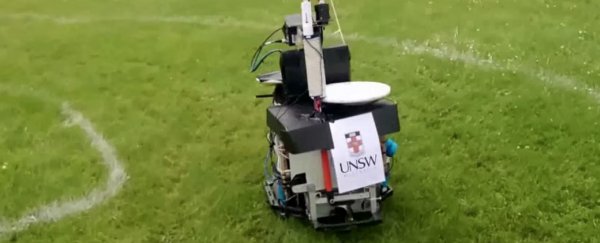An autonomous robot called Pepper has just taken out five awards at an international agility competition. The wheeled robot was built by engineering students at the University of New South Wales (UNSW), and it was the first time in 23 years that an Australian team had competed at the International Ground Vehicle Competition.
The competition is pretty unique in the robotics field, as competitors don't know what the course will be ahead of time. "All we know is that there will be white lines and fences, there will be obstacles of an approximate size and we have a vague idea of the course's shape," said UNSW mechatronics lecturer Mark Whitty, who travelled with the students to the competition in Michigan, US. "Other than that, the robot has to deal with whatever it sees."
To help Pepper cope with the unknown, the student team -which involved Stanley Lam, William Andrew, John Lam, Samuel Marden, Stephanie McArthur, and Fredrik Westling - gave the robot real-time sensing abilities so that it could work out where it is in relation to other objects around it, and then map its course accordingly.
"Pepper managed to break both course records and ran twice as fast as the only other robot that managed to complete the advanced course," said Whitty.
The performance also took out five awards, and second place overall in the competition: Rookie of the Year, best performance on the basic and advanced courses, and fourth place in the Interoperability Challenge.
You can see Pepper's performance below:
The students are now raising support and ideas to compete in the Mohamed Bin Zayed International Robotics Challenge in the Middle East next year. Their entry this year was sponsored by UNSW Engineering, Marathon Targets, Advanced Navigation and NSW Trade & Investment.
Not only is the work with Pepper pushing the envelope for autonomous robot design, it's also helping the students prepare for a career in robotics. "A lot of what you see in the robotics industry is in very controlled environments," said Whitty. "These students are making a name for themselves. They are making robots that can run in far less controlled environments, which is needed to improve automation."
You can see a full list of the team's sponsors here. We can't wait to see what Pepper does next.
Love engineering? Find out more about the game-changing work happening at UNSW Engineering. And
